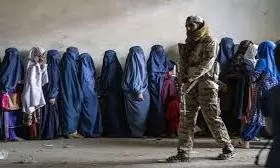
Taliban dismisses claims of banning Afghan women from 'hearing each other'
text_fieldsThe Taliban government in Afghanistan has denied reports claiming Afghan women are banned from speaking to one another, with a spokesperson calling the allegations "illogical."
Recent media reports, based on an audio recording of the Taliban's Ministry for the Propagation of Virtue and Prevention of Vice (PVPV) head, Mohammad Khalid Hanafi, suggested restrictions on women’s voices, sparking concerns over women's rights in Afghanistan.
Responding to these reports, PVPV spokesperson Saiful Islam Khyber stated that women are allowed to communicate with one another and dismissed the reports as "brainless." He clarified that while women must adhere to specific guidelines, such as using hand gestures instead of raising their voices while praying, there is no outright prohibition on women interacting.
However, Afghan women still face extensive restrictions.
The Taliban government has imposed laws under which women are not allowed to sing, recite poetry in public, or have their voices broadcast on television or radio in certain regions. The strict interpretation of Islamic law applied by the Taliban since 2021 has also led to bans on education beyond secondary school for girls, restrictions on employment, and a prohibition on visiting parks and other public spaces.
Despite these restrictions, the Taliban claims that all rights of Afghan citizens are protected under Islamic law. International organizations, including the United Nations, have condemned the measures, describing them as "gender apartheid" that disproportionately affects Afghan women.






















